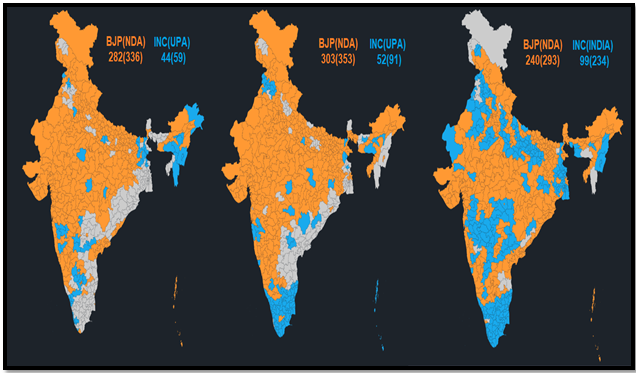THE VERDICT – 2024 GENERAL ELECTIONS
SYLLABUS:
GS 2:
- Indian Constitution—historical underpinnings, evolution, features, amendments, significant provisions and basic structure.
- Parliament and State legislatures—structure, functioning, conduct of business, powers & privileges and issues arising out of these.
Focus:
- Lok Sabha Election Results 2024 were declared on 4th June 2024.
Source: Reddit
Article highlights the public’s concerns about unemployment, low wages, and the high cost of essentials, which played a significant role in the electoral outcomes. Ghosh advocates for a shift towards a rights-based approach in economic policy to address these issues effectively.
|
India’s 2024 General Election Results Overview: The 2024 Indian general election was held from April 19 to June 1 across 543 constituencies to elect members of the Lok Sabha. Key Parties: The Bharatiya Janata Party (BJP) led by Narendra Modi, and the Indian National Congress (INC) led by Mallikarjun Kharge. Results: BJP: Won 240 seats, a decrease from the previous election. INC: Improved performance with 99 seats. Coalitions: NDA (National Democratic Alliance): BJP-led coalition won 292 seats. INDIA (Indian National Developmental Inclusive Alliance): Congress-led coalition won 234 seats. Voter Turnout: Around 66.33% of the registered voters participated. Prime Minister: Narendra Modi is poised to continue as Prime Minister. Notable Issues: Criticisms included the handling of hate speeches and EVM (Electronic Voting Machine) malfunctions. This election was notable for being one of the largest ever, with significant participation despite some controversies related to voting integrity and political campaigning. |
Economic Concerns in Lok Sabha Elections
- The recent Lok Sabha elections revealed significant dissatisfaction with economic management.
- Economic issues like unemployment, low wages, and high prices of essentials were central to voter concerns.
- Despite Modi government’s campaigns, these core economic problems were largely unaddressed.
- The elections showed that the basic livelihood challenges are pivotal for the majority of Indian citizens.
- The Modi government’s policies were seen as ineffective in tackling these deep-rooted economic crises.
INDIA Alliance’s Electoral Promises
- The INDIA alliance, particularly the Congress, focused on economic justice and livelihood issues.
- Their campaign promises resonated strongly with voters, especially in regions like Uttar Pradesh.
- Promises included enhancing employment opportunities and social security measures.
- The alliance aimed to shift economic policies to address public demands for social and economic justice.
- Their approach contrasted sharply with the Modi government’s perceived neglect of economic rights.
Proposed Policy Changes
- Ghosh advocates for a fundamental transformation of economic policies focused on human rights.
- Immediate changes needed include ensuring the right to work, food, education, social security, and health.
- Public delivery of services should be emphasized over privatization and exclusivity.
- Addressing the needs of micro, small, and medium enterprises with comprehensive support is crucial.
- Policy shifts should also consider the ongoing crises in farming and the effects of climate change.
Shift from Welfarism to Rights-Based Approach
- The Modi government’s welfare measures are criticized as superficial branding rather than substantive help.
- Successive governments have implemented welfare schemes, but these need to be framed as rights fulfillment.
- The discourse should move from viewing welfare as gifts from the government to affirming them as citizens’ rights.
- Examples include the Public Distribution System which needs to be seen as a right rather than a gift.
- This shift is essential for addressing the underlying economic disparities and ensuring sustainable development.
Federalism and Democratic Governance
- The election results could lead to a revival of federalism, moving away from centralized control.
- State governments play a crucial role in delivering public services directly affecting citizens.
- It’s vital for states to have autonomy in public service delivery without undue interference from the central government.
- Strengthening federalism is seen as a way to ensure more democratic and responsive governance.
- This shift could improve the effectiveness of local governments in managing economic and social policies.
Electoral Laws and Amendments
Electoral Disqualifications
Electoral Process
Election Machinery
Voting Systems
Voter Registration
|
Source:The Hindu
Mains Practice Question:
Q: Analyze the economic policy challenges in India as discussed by Jayati Ghosh, highlighting the implications of electoral outcomes on future economic reforms. Evaluate the necessity for a shift from a welfarism approach to a rights-based framework in addressing these challenges. Discuss the potential impact of strengthening federalism on effective public service delivery.
Associated Articles:
https://universalinstitutions.com/election-commission-of-india/




